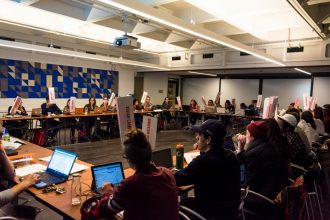The annual two-day Desautels Business Conference on Sustainability (DBCS) was held on the weekend of February 17th this year, appropriately themed ‘Managing for the Future’. Established in 2003, DBCS is the brainchild of a handful of Management students who set out to create a more environmentally-conscious realm within the business world. With several interactive panels, three keynote speakers and an intensive workshop, the 2016 DBCS was deemed a success, expected to expand its reach within the McGill community into the 2016-2017 school year.
What differentiates DBCS?
DBCS brings the important topic of sustainability into a business framework for McGill students. Sustainability is no longer a purely environmental issue; it will continue to have a broad range of growth-related, economic, financial and social implications on businesses. As future leaders and decision makers, it is imperative that McGill students are aware of how sustainability can impact their careers and futures.
Wenyun Zou, the DBCS Director of Speaker Relations, explained that “this year we really want to highlight the huge role sustainability will have on McGill graduates in the workplace by presenting four diverse topic panels: “Technology and Entrepreneurship”, “Revolutions in Sustainable Energy”, “Corporate Social Responsibility”, and “Sustainable Cities of the Future”.
We sat down with DBCS Executive Directors Haejoo Oh and Karen Tu to learn more.
1) What are DBCS’s goals for the McGill community?
Karen: To provide a platform for students and sustainability-related professionals to interact with one another, including providing students with insights into careers on sustainability and educating them on the importance of having a sustainable mindset.
Haejoo: DBCS’s main mission is to provide students with an active opportunity of engagement, learning, and inspiration. DBCS allows students to truly understand sustainable development.
2)What differentiates DBCS from other sustainability-related conferences?
Karen: DBCS aims to emphasize sustainable and business aspects while other conferences tend to focus on one or the other. For example, some sustainability-related conferences will focus on energy, an aspect of sustainability, but DBCS tends to have a broader scope. This year we had four panels with different topics and tried to provide students with comprehensive information about sustainability and business.
Haejoo: DBCS shines a light on key stakeholder groups in today’s sustainable development sphere, most specifically the corporate sector.
3) Regarding sustainability and the immediacy of the current environmental problems we are facing, what do you think all schools worldwide should be doing?
Karen: I remember a time when people majoring in environmental science came to Bronfman to teach students that coffee cups are not recyclable. I think that is a great example of how we can improve our environmental initiative at an individual level. I think a lot of us might not be as environmentally conscious as we should, not because we don’t want to, but because we are not aware of our practices. Raising awareness by correcting our everyday behaviour is a great way to contribute and make our society more sustainable.
Haejoo: Educational institutions have a special position in society as they foster future leaders and influencers. I think that universities like McGill are the perfect training ground to influence and shape young minds to care for sustainability and business, and change the ethos of the future generation. Student run conferences and events that promote sustainability and environmental awareness are a great platform for such development.
4) Why did you choose to become a part of DBCS and what has been the most valuable part?
Karen: I became a part of DBCS because I care about sustainability. In my opinion, sustainability is way more than just environmental problems and has become integrated into our everyday lives. I think DBCS is a great platform to bring in professionals with experience and provide students with a broader understanding of sustainability. The process of hosting the conference from scratch is the most valuable part of the experience, and I gained a better understanding of project management, leadership, and sustainability through it.
Haejoo: I joined the DBCS committee because I felt that it was crucial to inform future business leaders about the importance of sustainable development. For me, the most valuable part of the conference was knowing that we were able to provide students with a beneficial experience. We received lots of feedback from students on how the conference really challenged the way they perceived and thought of sustainability and the important role that the corporate sector has in sustainable development. It was truly valuable knowing that we organized a conference that served a great purpose at both Desautels and McGill.
We also had the opportunity to talk to several of the guest speakers regarding McGill’s movement towards a more sustainable campus. Francois Miller is currently the Manager of the McGill Office of Sustainability and is overseeing the implementation of the Vision 2020 Sustainability Strategy.
Have you noticed a change in the last few years regarding sustainability as a more widely and openly discussed issue among university students?
Francois: Our organization has made a lot of proactive changes regarding sustainability at McGill. One of the flagship program that we have is the Sustainability Projects fund, one of the biggest of its kind in North America. With this fund we are able to implement sustainability-related projects. It is worth approximately $850,000 CAD per year and comes both from student fees as well as the McGill administration. We have seen many concrete changes within the McGill community thanks to this fund. Another huge effort that was made in the past few years was Vision 2020, the McGill long-term sustainability plan.
What has been the Sustainability Fund’s biggest impact on the McGill community?
Francois: Project per project we are slowly transforming the culture around sustainability at McGill in regards to environmental, social and economic impacts. A very visible project on campus that we financed is Campus Crops, which transforms a piece of land for urban agriculture right here on campus. Another very interesting project is McGill Feeding McGill, where we bring crops from the Mac Campus to the cafeterias downtown. We try to put food production and availability within a closed loop.
Nik Luka, Associate Professor of the School of Architecture and the School of Urban Planning at McGill, touched upon another on-campus initiative during his panel. When Santropol Roulant, an organization using food as a conductor for youth engagement in urban food systems and community care, was kicked out of their previous location, the downtown campus offered them space to continue their work in. According to Nik, this partnership has turned hard, seemingly useless city spaces into a place of growth and sustainability.
DBCS serves as a clear testament to not only the variety of conferences organized by Management students, but also acts as an important reminder to students of all faculties that business is ever-changing, and the future of business in the 21st century lies in sustainable practices.



wow so informing, clearly written, and poignant!! thanks Aissa!!